
Vishakha Mahajan
(Ph.D. in Health Sciences (Molecular Biology), MSc. Reproductive and Developmental Biology, BSc. Biological Sciences and Health Policy Administration)
Our brain is a highly active organ that constantly requires nutrients to function properly.
Nutrition and diet patterns are one of the most modifiable factors that play an important role in maintaining health, vitality and longevity.
The 3 main macronutrient groups:
- proteins
- fats
- carbohydrates
supply us with the nutrients and energy required for the optimal functioning of the brain, which is what we are looking into more closely in this article.
Protein and amino acids
The association between protein and brain health has been long-studied. In a recent study published by Harvard University, it was concluded that a high protein diet, including intake of beans/legumes, fish, and lean poultry is important to protect and maintain cognitive function.[1]
Proteins have a specific purpose in our bodies and are also responsible for making different kinds of proteins and amino acids.
Our brain works as the command centre and communicates with different parts of the body, signalling them to execute their respective functions.
This communication happens via chemical messengers called neurotransmitters. Amino acids are essential for the synthesis of neurotransmitters, therefore playing a crucial role in the communication pathway.
RELATED — What are Amino Acids and what is their role in keeping us healthy?
Furthermore, the brain also plays a role in balancing food intake and energy expenditure to maintain healthy body weight.
A higher protein intake has been suggested to modulate these neuronal pathways to signal fullness to the brain, reducing appetite and increasing sense of satisfaction.
Higher protein intake is important for our brain to signal to our gut that we are satiated
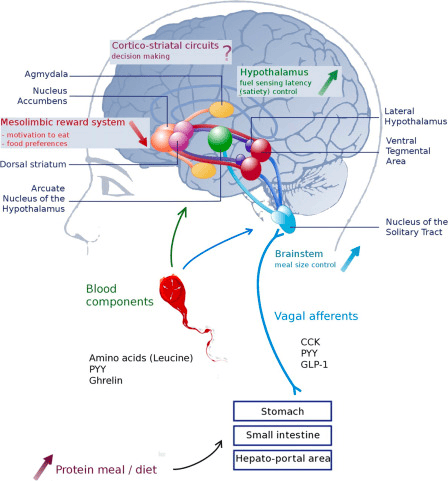
This is validated by a review article that looks at the brain areas and mechanisms involved in the satiating effect of proteins. It is suggested that after high-protein consumption, peptide hormones released in the gut, such as:
- cholecystokinin (CCK)
- glucagon peptide 1 (GLP-1)
- peptide YY (PYY)
communicate information about the energy status to the arcuate nucleus (ARC) in the brain, which is responsible for increased satiety, and further decreases the motivation to eat.[2]
It is therefore essential to include a diverse range of protein sources in our diet, such as:
- lean meats (lean meats are typically lower in fats (around 2-2.5%) and calories compared to other cuts)
- fish
- eggs
- dairy products
- legumes
- nuts
to ensure a well-rounded intake of essential amino acids.
A note on eggs
Being a complete protein source, meaning they contain all nine essential amino acids that the body cannot produce on its own, eggs are a great addition to the diet.
They are also rich in other nutrients such as vitamins and minerals like choline that are also crucial for brain health.
Monounsaturated Fats
Fats often have a negative connotation associated with them. In saying that, it’s important to understand the distinction between the types of fats, which to have and which should be minimised and avoided.
RELATED — Types of Fats: Healthy and Unhealthy Dietary Fats
Interestingly, the human brain is nearly 60 percent fat. The fats we consume via foods can be divided into unhealthy (saturated and trans) and healthy (monounsaturated and polyunsaturated) fats.
Over the years, we have learnt that fatty acids are amongst the most crucial molecules that determine the brain’s structural integrity and function.
Monounsaturated fatty acids are healthy fats often found in plants and plant oils such as avocados, peanut butter, olive oil, certain seeds and nuts.
Five foods that are high in monounsaturated fats (MUFA):
Food | Serving size | Amount of total fat | % of MUFA present in one serving |
Olive oil | 1 tbsp | 14g | 70-80% |
Avocado | 1 medium | 22g | 68-70% |
Almonds | 23 almonds | 14g | 80% |
Pumpkin Seeds | 28g | 5.5g | 55.48 to 65.19% |
Peanuts | 28 peanuts | 14g | 50% |
The Mediterranean diet, typically including lower intake of saturated fats and higher intake of monounsaturated fats in the form of olive oil, has been extensively researched for its benefits.
A review published in 2021 reported a reduced risk of coronary heart disease in women by 29% and stroke by 13% following a mediterranean diet.[3]
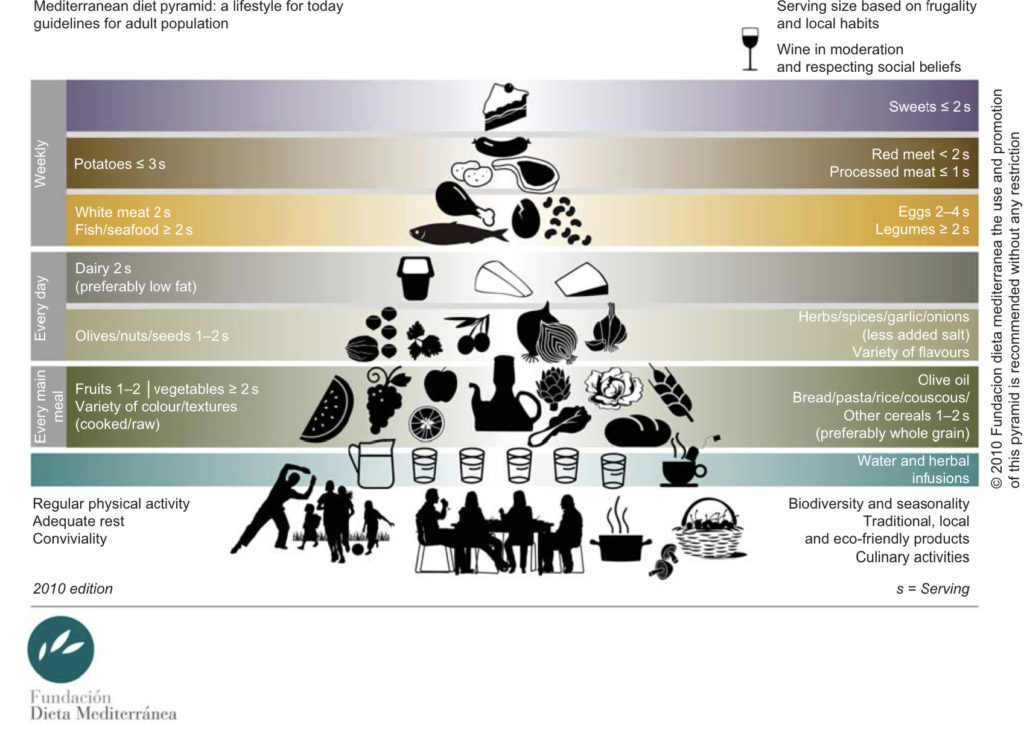
Adhering to the Mediterranean diet is associated with less cognitive decline and a lower risk of Alzheimer’s Disease.[4]
The health benefits of olive oil have often been attributed to its 70-80% oleic acid (OA) content. Oleic Acid represents the most commonly found monounsaturated fatty acid (MUFA) found in the diet, accounting for at least 90% of all MUFAs.
In the brain, oleic acid is a key component of cell membranes and in the myelin, a protective layer that sits around nerves in the brain and spinal cord and helps in neural communication pathways.
In a series of recent research, the ability of oleic acid to execute anti-inflammatory functions via epigenetic mechanisms has been suggested.[5]
Oleic acid is a natural activator of SIRT-1
SIRT-1 is a protein that prevents inflammation and oxidative stress contributing to positive therapeutic outcomes.[5]
Example of a superfood high in monounsaturated fats — Olive Oil
Particularly, extra virgin olive oil, it is not only rich in oleic acid, but also contains potent antioxidants, such as polyphenols and vitamin E, which help protect cells from oxidative damage caused by free radicals.
Polyunsaturated Fats
Polyunsaturated fats (PUFAs) include Omega-6 and Omega-3 fatty acids both of which are essential for brain function.
These healthy fats have been long-known to help lower your bad cholesterol (LDL), and including them in the diet is associated with reduced risk for heart disease.
However, their role in brain health, while very well-researched, is less commonly known.
Types of Omega-3 fats include:
- ALA (alpha linolenic acid)
- DHA (Docosahexaenoic acid)
- EPA (Eicosapentaenoic acid)
Types of Omega-6 fats include:
- LA (Linoleic acid)
- ARA (Arachidonic Acid)
- GLA (Gamma linoleic)
- CLA (Conjugated linoleic acid)
Omega-3 and Omega-6 fats are essential fatty acids that the body needs for optimal brain function and growth.
The main Omega-3 and 6 acids found in the brain are the DHA and ARA, respectively. These acids regulate neurobiological processes and are pivotal in brain physiology.
Unfortunately our bodies are unable to make these fatty acids, which means we must get them from food.
Five foods that are high in polyunsaturated fats (PUFA):
Food | Serving Size | Amount of total fat | % of PUFA present in one serving |
Sardines | 100g | 11g | 42% |
Flaxseed | 1 Tbsp or 10.3g | 4.3g | 73% |
Chia Seeds | 28g | 30.7g | 77% |
Flaxseed oil | 1 Tbsp or 13.6g | 14g | 66% |
Walnuts | 28g or 14 walnut halves | 18.5g | 14% |
PUFAs are crucial for brain health across our lifespan
They play a role in brain development during infancy, maintain cognitive function through adulthood and protect against neurodegenerative conditions in older years.[6]
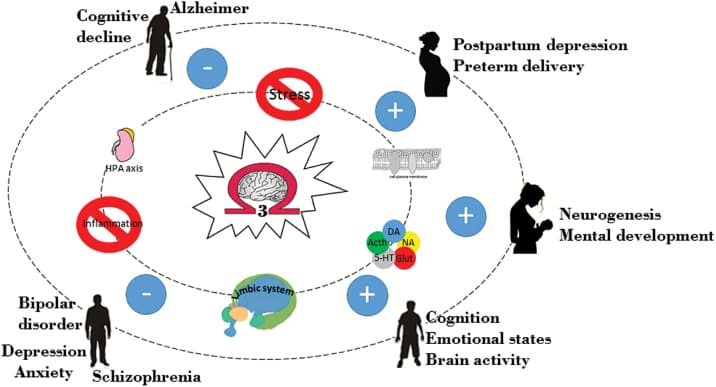
Research indicates that including higher amount of polyunsaturated fats and lowering amount of saturated fats as part of a protective diet helps lower inflammation and reduced blood levels of amyloid-beta — the protein that builds up in the brains of people with Alzheimer’s disease and hinders with the communication pathway between brain cells.[7]
This can be correlated with another study conducted in mice, that concluded that Omega-3s have protective effects against another common pathological feature seen in brains of individuals with Alzhiemer’s disease, which are microinfarcts.[8]
Microinfarcts are small areas of tissue damage/lesions resulting from reduced blood flow contributing to cognitive decline.
Researchers found that fish oil administration for nine months significantly reduced lesions in three main regions of the brain.[8]
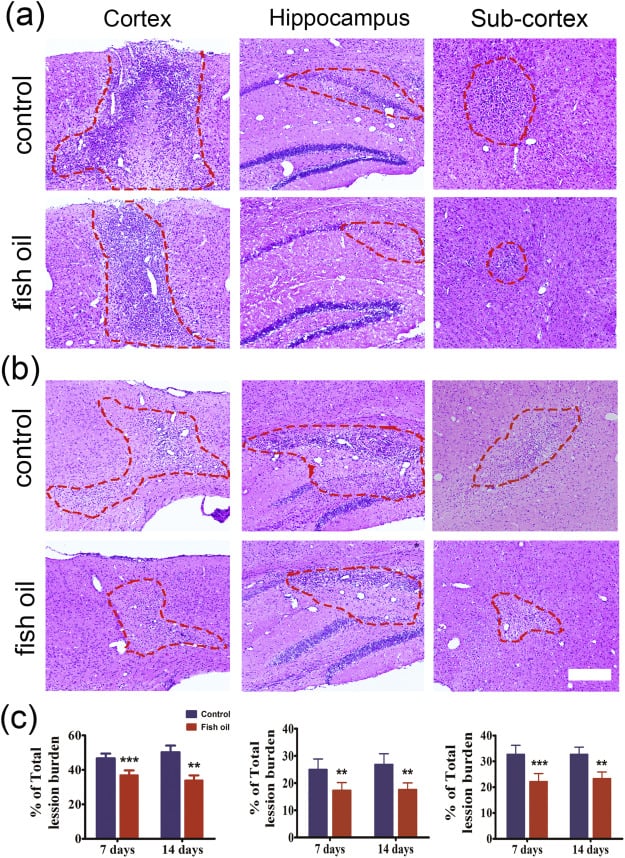
a) HE staining showing the lesion in the cortex, hippocampus and sub-cortex at 7 d after the surgery (the red dotted line represents the lesion zone).
b) HE staining showing the lesion in the cortex, hippocampus and sub-cortex at 14 d after the surgery (the red dotted line represents the lesion zone).
c) Compared with the control group, fish oil treatment significantly attenuated the lesion burden in the cortex, hippocampus and sub-cortex
Example of a superfood high in polyunsaturated fats — Sardines
Sardines, salty fish that are rich sources of Omega-3’s EPA and DHA, which are known to support cognitive function, memory, and reduce the risk of cognitive decline with age.
They are low in saturated fat and packed with vitamins D and B12, which contribute toward brain health.
Saturated Fats
While it is apparent that monounsaturated and polyunsaturated fats are good for us, there are some types of fats that we do need to be cautious about.
This includes intake of trans fats that most nutritionists and health professionals agree, should be avoided and saturated fats that must be limited.
Saturated fats are solids at room temperature and are included in foods like butter, palm and coconut oils, cheese, red meat and commercially prepared baked goods.
High saturated fat diets have been linked with increased oxidative stress and inflammation making it a risk factor for cognitive decline, brain ageing and neurodegenerative disorders.[9]
Furthermore, a study concluded that a high saturated fat diet increased ceramides in rat models.[10]
However, it’s important to acknowledge that although animal models offer a chance to enhance our understanding of the mechanistic consequences of dietary patterns, their translational value is limited.
The animal diet consisted only of saturated fat and simple sugars, which is not representative of a typical diet consumed by humans.
Carbohydrates (grains and legumes)
Our brain needs a continuous source of fuel, such as glucose, which it gets from carbohydrates.
Alternatively, ketones can also serve as a fuel source for the brain during limited glucose availability. This includes situations such as fasting, low-carbohydrate diets, or in cases where glucose metabolism is altered.
Carbohydrates in the food are broken down into glucose (single sugar units) and absorbed from the gut into the blood.
Glycaemic index (GI) of a food refers to the rate at which it breaks down.
There are a variety of carbohydrate sources to choose from, such as simple to complex and low GI to high GI.
Choosing low GI sources of carbohydrates allows for a slower digestion, preventing blood sugar spikes that can lead to type 2 diabetes, a comorbidity that is also associated with cognitive decline.
A recent paper published looked at 23 studies evaluating the association between increased intake of whole grains and cognitive health.
Several of these studies established a link with reduced risk of cognitive decline and interestingly, a strong correlation was found between whole grains and better mood/anxiety.[11]
One plausible mechanism of action has been reported to be through stabilising blood sugar levels. Thus, suggesting that including grains and legumes in your diet is an example of a good source of carbohydrate that can support overall brain function as well as cardiovascular health.[11]
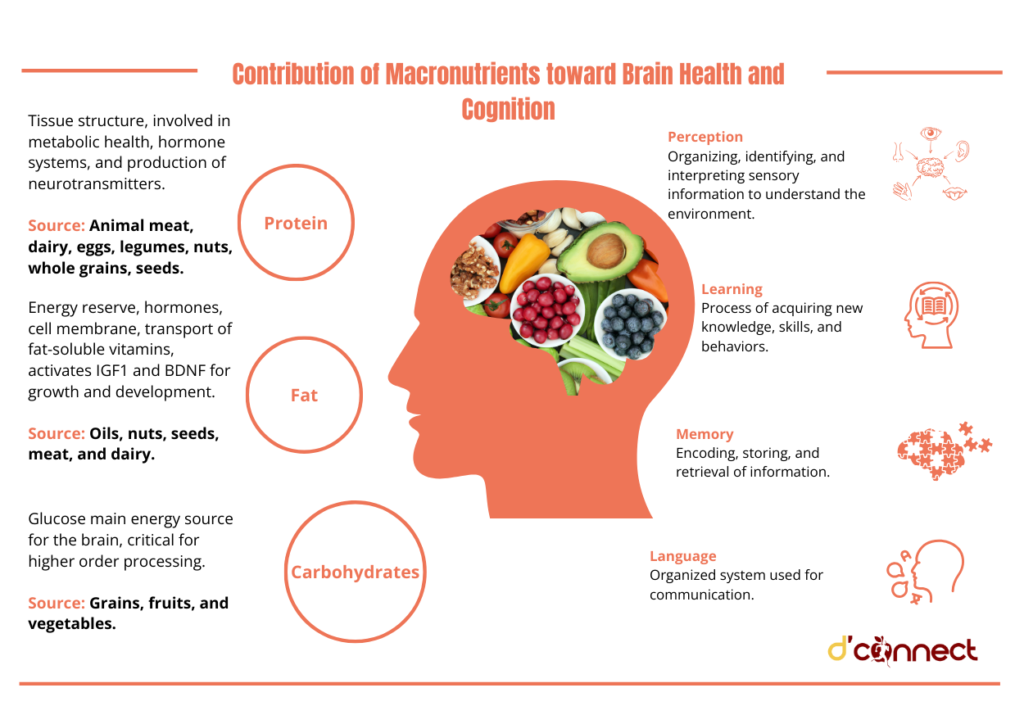
In the elderly, cognitive impairment and the risk of neurological diseases including dementia, can be reduced through modifying the intake of specific macro and micronutrients. This includes adding:
- B vitamins
- flavonoids
- long-chain Omega-3 fatty acids.[12]
Growing evidence on low carbohydrate and high fat ketogenic diets, where ketones provide as the brain’s main bioenergy source, are considered beneficial.
As we get older, enjoying a ketogenic diet is shown to be neuroprotective
There is a suggested association of ketones with neuroprotective effects that aid in cognitive impairment prevention and improve cognition.[13]
A review article published in 2022 comprehensively evaluates research on ketogenic interventions in relation to cognitive deficits seen in mild cognitive impairment (MCI) as well as Alzhiemer’s Disease.[13]
Moreover, in a 6-week intervention study, 23 older adults with MCI, were randomly assigned to either a high or a very low carbohydrate diet.[14]
The findings indicated that those who followed a very low carbohydrate diet, with detected ketones in their urine, had an improved memory function even in the short-term.
Especially in older adults, with increased risk for Alzheimer’s Disease, a ketogenic diet, associated with reduced inflammation and improved cognitive function, holds enormous implications.[14]
Example of a superfood high in carbohydrates — Oatmeal
Oats or oatmeal has low GI, high dietary fibre, it slows digestion and stabilises blood sugar and has a rich nutrient profile which includes B vitamins, iron, and magnesium.
RELATED — Magnesium (for a great night of sleep)
Oatmeal also acts as a pre-biotic, feeding beneficial bacteria in the gut and promoting a healthy microbiome.
Plants, fruits and vegetables
Plants, fruits, and vegetables house a wealth of nutrients, rich in phytochemicals, vital for the growth and sustenance of both plants and animals.
Some studies however, have presented the concept of “anti-nutrients” in plants, questioning their healthfulness.[15]
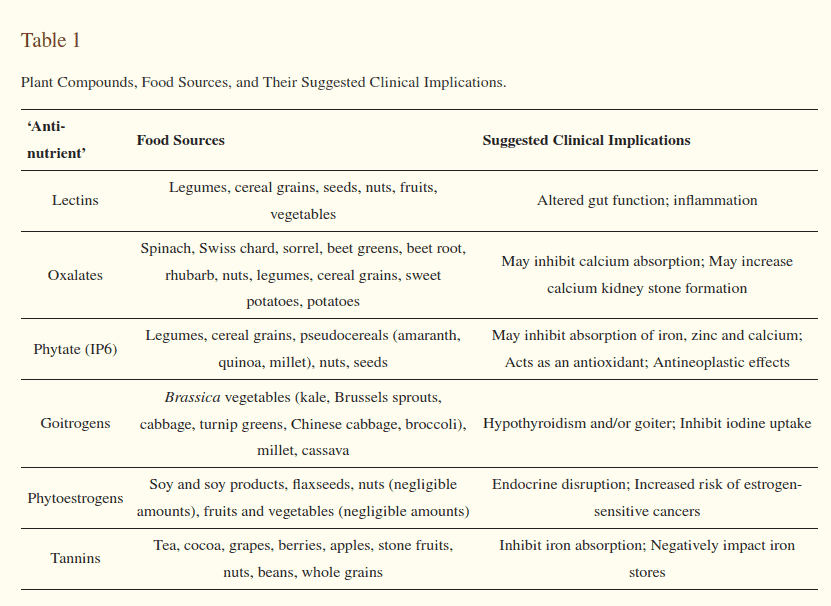
Anti-nutrients are natural substances, found in plant-based foods, which are thought to restrict the absorption of essential nutrients. These compounds include:
- lectins
- oxalates
- phytates
- phytoestrogens
- tannins
Whether these compounds are potentially harmful, isn’t entirely established. Moreover, some of these compounds, in smaller quantities, may also be therapeutic agents for various conditions warranting more research into their impact.[15]
Plants, fruits and vegetables are naturally rich in bio-active compounds called polyphenols. Flavonoids are a subclass under polyphenols that give plants and fruits their vibrant colour.
The anthocyanins responsible for the deep blue hue of blueberries, the catechins found in apricots, quercetin that abundantly enriches broccoli or the kaempferol found in green leafy vegetables, are examples of flavonoids.
All these flavonoid compounds are known for their varied health-giving properties, which include being:
- anti-inflammatory
- anti-oxidative
- anti-tumorigenesis
- anti-microbial[16]
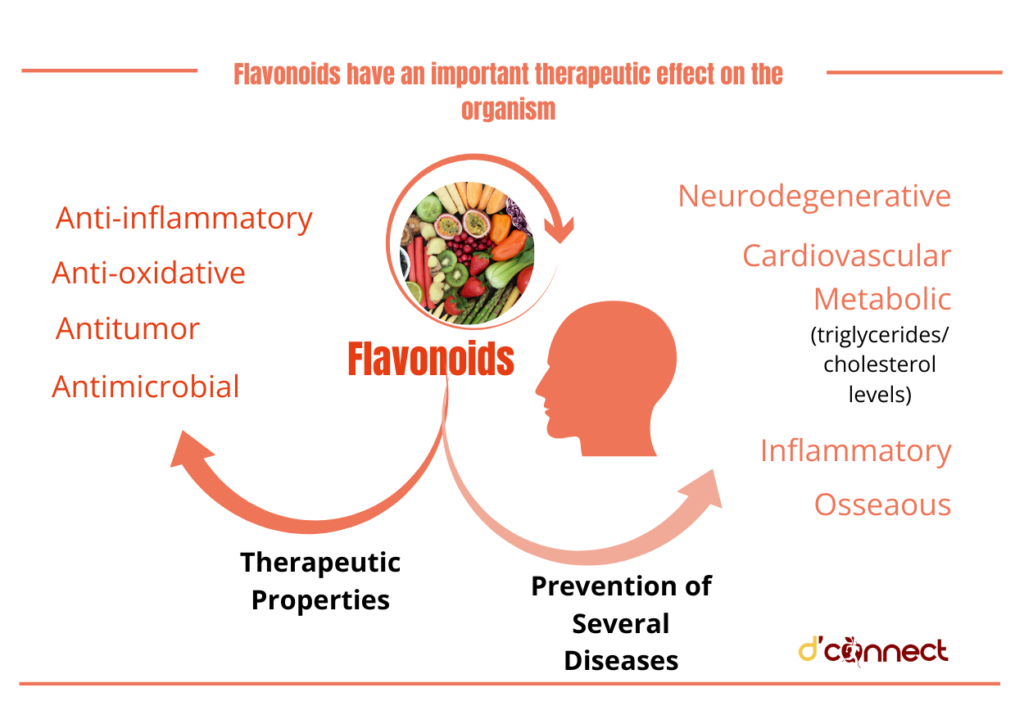
Adequate intake of fruits and vegetables was correlated with exerting neuroprotective effects through increased blood brain flow, neuronal communication and lower levels of oxidative stress biomarkers.[17]
The elderly are susceptible to increased oxidative damage in the brain. Subsequently, elevated oxidative stress has been linked to the development of neurodegenerative disorders.
A review article discusses the mechanisms by which dietary antioxidants could be useful in the prevention and treatment of neurodegenerative diseases.[17]
The image below depicts that dietary antioxidants reduce reactive oxygen species (ROS) which cause oxidative damage in three ways:
1) by directly stopping ROS from causing damage,
2) by boosting the production of antioxidant enzymes which neutralise ROS,
3) by triggering the production of an antioxidant called NRF2, which blocks a protein (NF-kB), associated with inflammation, thus reducing ROS production.
These mechanisms together reduce amyloid beta protein accumulation and other factors, protecting the brain from cellular damage and degeneration.
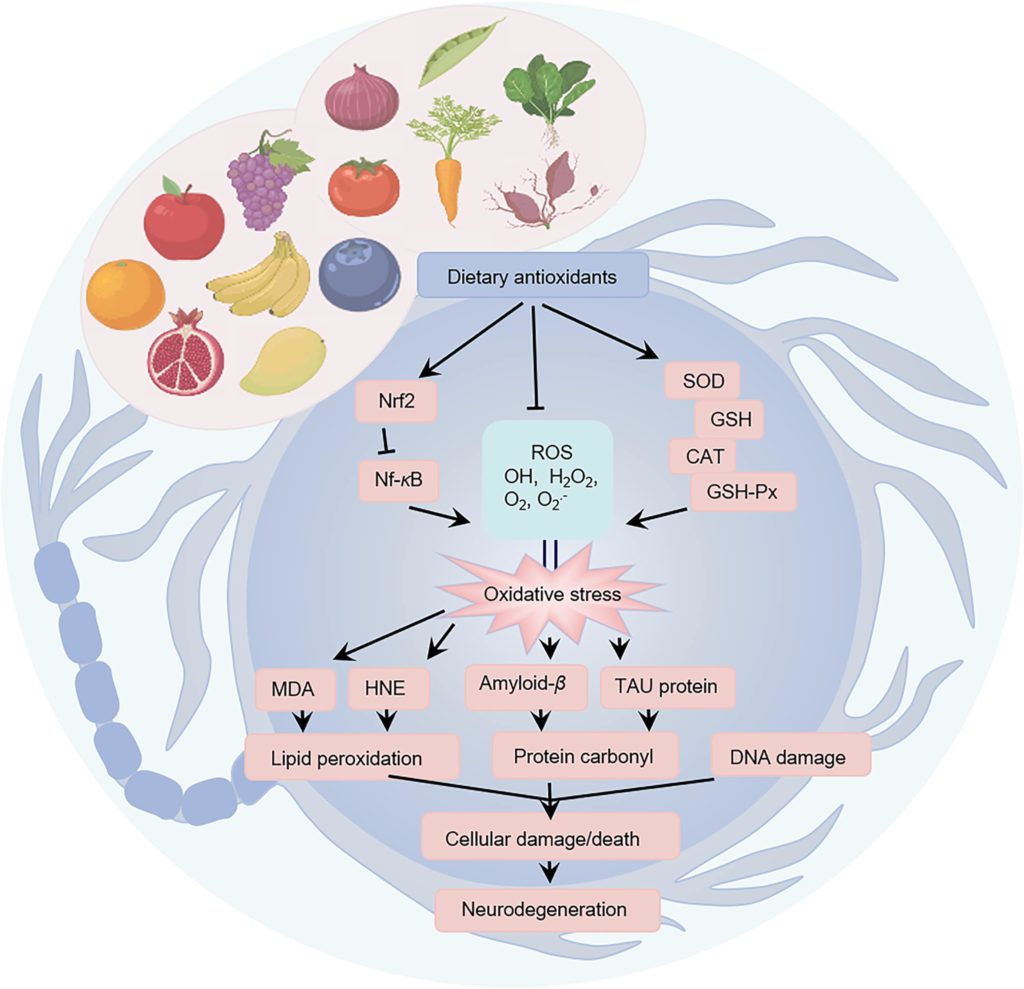
The brain consumes ~20% of the body oxygen to function, generating free radicals for neuron growth, communication, and cognition.
The brain is highly susceptible to oxidative stress, caused by an imbalance between free radicals and antioxidants.[18] This affects brain cells, increasing vulnerability to neurodegenerative diseases.
Polyphenols effectively neutralise free radicals, reducing oxidative damage and offering neuroprotective advantages against aging and degenerative conditions.
Incorporating diverse coloured fruits and vegetables enhances brain health by enriching our diet with essential nutrients, vitamins, and minerals.
Example of a superfood fruit — Blackcurrants
Growing research into blackcurrants suggest its high polyphenol content and other phytochemicals are great for brain health and cognitive function.[19]
Related Questions
1. Should seniors and elderly people increase or reduce protein intake?
Protein as a key nutrient for elderly adults and increasing protein intake over the recommended amounts may help maintain their cognitive and brain function, improving quality of life.
2. What is the worst type of food for brain health and cognition?
Sugar and saturated fats are both detrimental in distinct ways.
Excessive sugar consumption leads to blood sugar fluctuations, impacting mood, memory, and cognition.
Saturated fats contribute to neuroinflammation and plaque accumulation, resulting in brain ageing and increased susceptibility to degenerative diseases.
3. Can monounsaturated and polyunsaturated fats help with cognitive health and delay cognitive decline?
Yes, both monounsaturated and polyunsaturated fats have anti-inflammatory, antioxidant and neuroprotective properties.
They provide brain cells with structural integrity, keeping them healthy and functional.
References
(1) Yeh, T.S., Yuan, C., Ascherio, A., Rosner, B.A., Blacker, D., Willett, W.C. (2022). Long-term dietary protein intake and subjective cognitive decline in US men and women. Am J Clin Nutr [Internet].
(2) Journel, M., Chaumontet, C., Darcel, N., Fromentin, G., Tomé, D. (2012). Thematic Review Series: Nutrient Control of Metabolism and Cell Signaling Brain Responses to High-Protein Diets. https://www.sciencedirect.com/science/article/pii/S2161831322010006
(3) Guasch-Ferre, M., and Willet W.C.(2021) The Mediterranean diet and health: a comprehensive overview. Journal of Internal Medicine. https://onlinelibrary.wiley.com/doi/full/10.1111/joim.13333
(4) van den Brink, A.C., Brouwer-Brolsma, E.M., Berendsen, A.A.M., van de Rest, O. (2019) The Mediterranean, Dietary Approaches to Stop Hypertension (DASH), and Mediterranean-DASH Intervention for Neurodegenerative Delay (MIND) Diets Are Associated with Less Cognitive Decline and a Lower Risk of Alzheimer’s Disease-A Review. Adv Nutr. https://www.ncbi.nlm.nih.gov/pmc/articles/PMC6855954/
(5) Santa-María, C., López-Enríquez, S., Montserrat-de la Paz, S., Geniz, I., Reyes-Quiroz, M.E., Moreno, M., et al. (2023) Update on Anti-Inflammatory Molecular Mechanisms Induced by Oleic Acid. Nutrients [Internet]. https://www.ncbi.nlm.nih.gov/pmc/articles/PMC9824542/
(6) Pusceddu, M.M., Kelly, P., Stanton, C., Cryan, J.F., Dinan, T. G. (2016) N-3 Polyunsaturated Fatty Acids through the Lifespan: Implication for Psychopathology. Int J Neuropsychopharmacol.
(7) Gu, Y., Nieves, J.W., Stern, Y., Luchsinger, J.A., Scarmeas, N. (2010) Food Combination and Alzheimer Disease Risk: A Protective Diet. Arch Neurol.
(8) Luo, C., Ren, H., Yao, X., Shi, Z., Liang, F., Kang, J.X., Wan, J.B., Pei, Z., Su, K.P., Su, H. (2018). Enriched Brain Omega-3 Polyunsaturated Fatty Acids Confer Neuroprotection against Microinfarction. eBioMedicine, The Lancet Discovery. https://www.thelancet.com/article/S2352-3964(18)30193-2/fulltext
(9) Freeman, L.R., Haley-Zitlin, V., Rosenberger, D.S., Granholm, A. C. (2014) Damaging effects of a high-fat diet to the brain and cognition: a review of proposed mechanisms. Nutr Neurosci. https://www.ncbi.nlm.nih.gov/pmc/articles/PMC4074256/
(10) Stranahan, A.M., Cutler, R.G., Button, C., Telljohann, R., Mattson, M.P. (2011) Diet-induced elevations in serum cholesterol are associated with alterations in hippocampal lipid metabolism and increased oxidative stress. J Neurochem.
(11) Ross, A.B., Shertukde, S.P., Livingston Staffier, K., Chung, M., Jacques, P.F., Mckeown, N.M. (2023) The Relationship between Whole-Grain Intake and Measures of Cognitive Decline, Mood, and Anxiety-A Systematic Review. https://www.sciencedirect.com/science/article/pii/S2161831323002880
(12) Melzer, T.M., Manosso, L.M., Yau, S.Y., Gil-Mohapel, J., Brocardo, P.S. (2021) In Pursuit of Healthy Aging: Effects of Nutrition on Brain Function. Int J Mol Sci. https://www.ncbi.nlm.nih.gov/pmc/articles/PMC8126018/
(13) Altayyar, M., Nasser, J.A., Thomopoulos, D., Bruneau, M. Jr. (2022) The Implication of Physiological Ketosis on The Cognitive Brain: A Narrative Review. Nutrients. https://www.ncbi.nlm.nih.gov/pmc/articles/PMC8840718/
(14) Krikorian, R., Shidler M.D., Dangelo, K., Couch, S.C., Benoit, S.C., Clegg D.J. (2012) Dietary ketosis enhances memory in mild cognitive impairment. Neurobiol. Aging.
(15) Petroski, W., Minich, D.M. (2020) Is There Such a Thing as “Anti-Nutrients”? A Narrative Review of Perceived Problematic Plant Compounds. Nutrients. https://www.ncbi.nlm.nih.gov/pmc/articles/PMC7600777/
(16) Buchaim, R., Ortiz, A., Fideles, S., Buchaim, D. (2024) Biological Properties of Flavonoids. Encyclopedia. Available online: https://encyclopedia.pub/entry/22722
(17) Feng, J., Zheng, Y., Guo, M., Ares, I., Martínez, M., Lopez-Torres, B., Martínez-Larrañaga, M.R., Wang, X., Anadón, A., and Martínez, M.A. (2023) ‘Oxidative stress, the blood–brain barrier and neurodegenerative diseases: The critical beneficial role of dietary antioxidants’, Acta Pharmaceutica Sinica B. https://www.ncbi.nlm.nih.gov/pmc/articles/PMC6836211/
(18) Cobley, J.N., Fiorello, M.L., Bailey, D.M. (2018) 13 reasons why the brain is susceptible to oxidative stress. Redox Biol [Internet].
(19) Watson, A., Haskell-Ramsay, C.F., Kennedy, D.O., Cooney, J.M., Trower, T., Scheepens, A., (2015) Acute supplementation with blackcurrant extracts modulates cognitive functioning and inhibits monoamine oxidase-B in healthy young adults, Journal of Functional Foods.






